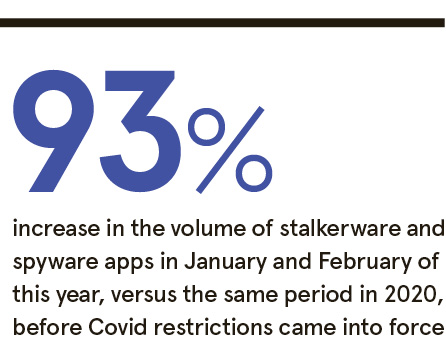
Technology is a powerful tool and the online world served as a real lifeline for many in the pandemic. However, it also provides some people with a new way to stalk, isolate and control women, as well as target and take advantage of some of the most vulnerable people in society.
Research by Avast, a global provider of digital security and privacy products, revealed a huge increase in the use of stalkerware and spyware apps in the UK since lockdown measures were first introduced. The volume of stalkerware and spyware apps in January and February of this year increased 93% on the same period in 2020 before Covid restrictions came into force.
“Depending on which country you look at, sometimes it’s a 300% rise, sometimes it’s a 100% rise,” says Jaya Baloo, chief information security officer at Avast. “It’s a dramatic difference from the year before, and we think it’s been brought about by the pandemic.”
Alarmingly, the growth in stalkerware seems to echo the increase in domestic abuse cases across the UK since lockdown measures came into force. Refuge, which provides specialist support for women and children experiencing domestic abuse, reported that between April 2020 and February 2021 calls and contacts logged on Refuge’s National Domestic Abuse Helpline (NDAH) were up by an average of 61%.
Over a third of Neighbourhood Watch members are now
more concerned about cybercrime than physical crime
Stalkerware apps give abusers another way to exert control over their victims. Often advertised for monitoring children, employees or loved ones, they are generally installed on the victim’s phone by jealous spouses, abusive ex-partners, or so-called friends. The perpetrator can potentially gain access to a victim’s photos, videos, emails, texts and WhatsApp and Facebook messages, as well as eavesdrop on phone calls and make covert recordings of online conversations.
“These apps act as a trusted party on the device, like any app that would have full permission, and therefore they can do multiple things,” says Baloo. “So it’s not just about tracking the victim’s physical location.” Once installed on the victim’s device, stalkerware is also incredibly hard to detect. “You don’t receive any alerts. It’s surreptitiously running in the background, so it requires some significant skills [to discover and remove].”
As well as partnering with Refuge to support its Tech Abuse support line, the company is also a member of the Coalition Against Stalkerware, a cross-industry organisation committed to raising public awareness about the issue. Avast continuously monitors and reports stalkerware apps. For example in 2019, Avast mobile threat researchers identified and worked to remove several stalkerware apps from the Google Play Store.
“We want to be on both sides of the timeline, making sure that appropriate protections are employed before there’s ever a victim, trying to get rid of the companies that make this [stalkerware] possible in the first place, and educating victims about what you can do to make sure you don’t get revictimised,” says Baloo.
Protecting the most vulnerable in society
As well as the growth of tech abuse within relationships, cybercriminals are also actively targeting the more vulnerable in society. Romance fraud, government and bank impersonation schemes and tech support scams all aim to exploit a group that are online more than ever before, but which sometimes lack the knowledge, skills and confidence of younger generations or those who are more digitally savvy.
To tackle the issue, Avast teamed up with Neighbourhood Watch to create a joint Cyberhood Watch initiative. Together, it helps members and volunteers learn more about the cybersecurity risks that exist online, and provides clear, simple tips on the steps they can take to protect themselves.

Research by Avast and Neighbourhood Watch found that over a third of Neighbourhood Watch members are now more concerned about cybercrime than physical crime. “We knew there was a concern, but we were quite surprised at the level of it,” says John Hayward-Cripps, CEO of the Neighbourhood Watch.
According to a survey of 28,000 Neighbourhood Watch members, 18% have been victims of cybercrime in the past year, while 33% know someone else who has. In terms of financial impact, over a third of victims (36%) lost money and of them, 23% lost more than £1000. A further 39% of the 28,000 members polled had experienced an increase in the number of targeted phishing attempts. The majority of these crimes were kept secret by the victims, with only 27% reporting the incident to the police.
This seems to indicate a general lack of confidence in talking about cybercrime experiences within the community, as well as a gap in understanding the best methods for protecting yourself online. “None of us want to admit we’ve been daft, even though the reality is that scammers are really good at what they do,” says Hayward-Cripps. “If it wasn’t successful, they wouldn’t do it.”
One of the unique features of the Cyberhood Watch initiative is its network of community ambassadors, who help to initiate conversations about cybersecurity. “These are ordinary people that have been trained to act as a kind of hub, talking about these issues to local groups or answering questions that people have got locally,” says Hayward-Cripps.
Examples of what people can do to protect themselves online include not opening links or downloading items from unknown senders, as well as installing a solution like Avast Mobile Security. Similarly, there are steps women can take to detect and protect themselves against stalkerware, including protecting their phones with biometric logins, unique pins or passwords, and installing antivirus software that will alert them to any attempt to install stalkerware and help them remove it.
“The most vulnerable part of the population can actually protect themselves relatively easily. But they just don’t realise that they need to deploy some basic mechanisms to do so,” says Baloo, who feels that many digital security firms have “cultivated an environment of fear around technology without cultivating equal transparency in terms of what you can do to reduce that fear.”
In other words, while stalkerware and scams pose a very real threat to vulnerable people, with the right information and tools anyone can become a confident and empowered digital citizen, and enjoy all the benefits that technology has to offer.
For more information please visit: www.avast.com
For further information on Avast’s Cyberhood Watch programme please visit: www.avast.com/uk-cyberhood
Sponsored by

